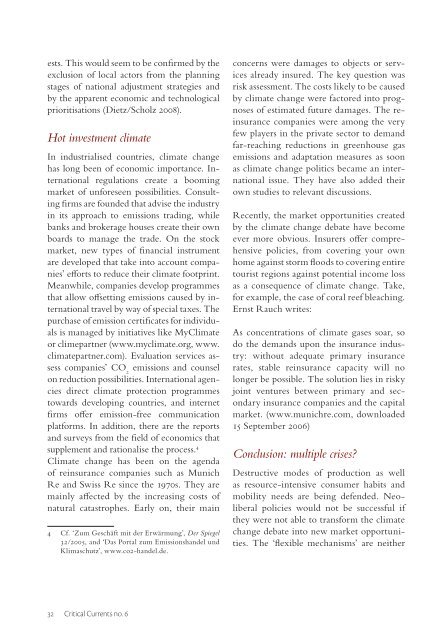Contours of Climate Justice - Dag Hammarskjöld Foundation
Contours of Climate Justice - Dag Hammarskjöld Foundation
Contours of Climate Justice - Dag Hammarskjöld Foundation
You also want an ePaper? Increase the reach of your titles
YUMPU automatically turns print PDFs into web optimized ePapers that Google loves.
ests. This would seem to be confi rmed by the<br />
exclusion <strong>of</strong> local actors from the planning<br />
stages <strong>of</strong> national adjustment strategies and<br />
by the apparent economic and technological<br />
prioritisations (Dietz/Scholz 2008).<br />
Hot investment climate<br />
In industrialised countries, climate change<br />
has long been <strong>of</strong> economic importance. International<br />
regulations create a booming<br />
market <strong>of</strong> unforeseen possibilities. Consulting<br />
fi rms are founded that advise the industry<br />
in its approach to emissions trading, while<br />
banks and brokerage houses create their own<br />
boards to manage the trade. On the stock<br />
market, new types <strong>of</strong> fi nancial instrument<br />
are developed that take into account companies’<br />
eff orts to reduce their climate footprint.<br />
Meanwhile, companies develop programmes<br />
that allow <strong>of</strong>f setting emissions caused by international<br />
travel by way <strong>of</strong> special taxes. The<br />
purchase <strong>of</strong> emission certifi cates for individuals<br />
is managed by initiatives like My<strong>Climate</strong><br />
or climepartner (www.myclimate.org, www.<br />
climatepartner.com). Evaluation services assess<br />
companies’ CO 2 emissions and counsel<br />
on reduction possibilities. International agencies<br />
direct climate protection programmes<br />
towards developing countries, and internet<br />
fi rms <strong>of</strong>f er emission-free communication<br />
platforms. In addition, there are the reports<br />
and surveys from the fi eld <strong>of</strong> economics that<br />
supplement and rationalise the process. 4<br />
<strong>Climate</strong> change has been on the agenda<br />
<strong>of</strong> reinsurance companies such as Munich<br />
Re and Swiss Re since the 1970s. They are<br />
mainly aff ected by the increasing costs <strong>of</strong><br />
natural catastrophes. Early on, their main<br />
4 Cf. ‘Zum Geschäft mit der Erwärmung’, Der Spiegel<br />
32/2005, and ‘Das Portal zum Emissionshandel und<br />
Klimaschutz’, www.co2-handel.de.<br />
32 Critical Currents no. 6<br />
concerns were damages to objects or services<br />
already insured. The key question was<br />
risk assessment. The costs likely to be caused<br />
by climate change were factored into prognoses<br />
<strong>of</strong> estimated future damages. The reinsurance<br />
companies were among the very<br />
few players in the private sector to demand<br />
far-reaching reductions in greenhouse gas<br />
emissions and adaptation measures as soon<br />
as climate change politics became an international<br />
issue. They have also added their<br />
own studies to relevant discussions.<br />
Recently, the market opportunities created<br />
by the climate change debate have become<br />
ever more obvious. Insurers <strong>of</strong>f er comprehensive<br />
policies, from covering your own<br />
home against storm fl oods to covering entire<br />
tourist regions against potential income loss<br />
as a consequence <strong>of</strong> climate change. Take,<br />
for example, the case <strong>of</strong> coral reef bleaching.<br />
Ernst Rauch writes:<br />
As concentrations <strong>of</strong> climate gases soar, so<br />
do the demands upon the insurance industry:<br />
without adequate primary insurance<br />
rates, stable reinsurance capacity will no<br />
longer be possible. The solution lies in risky<br />
joint ventures between primary and secondary<br />
insurance companies and the capital<br />
market. (www.munichre.com, downloaded<br />
15 September 2006)<br />
Conclusion: multiple crises?<br />
Destructive modes <strong>of</strong> production as well<br />
as resource-intensive consumer habits and<br />
mobility needs are being defended. Neoliberal<br />
policies would not be successful if<br />
they were not able to transform the climate<br />
change debate into new market opportunities.<br />
The ‘fl exible mechanisms’ are neither
















